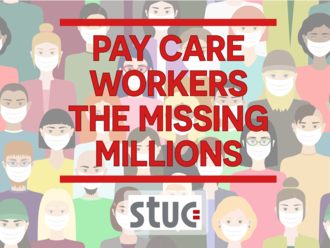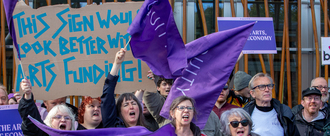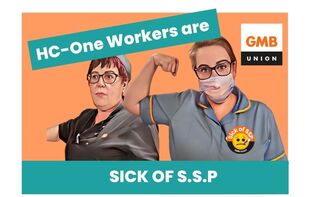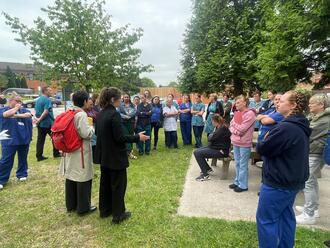-
DSFS - Staff at Chesterfield Royal Deserve Pay Parity!Staff working for DSFS provide vital services that keep Chesterfield Royal Hospital working, they work side by side with NHS staff and deserve to be rewarded in the same manor.1,059 of 2,000 SignaturesCreated by James Olner
-
Say ‘No’ to privatisation of NHS finance functions, putting 84 jobs on the lineThese circumstances directly impact 84 hardworking and devoted members of NHS staff, many of whom have been loyal employees for up to 35 years. Previous outsourcing experiments such as Carillion and Circle have shown that the private sector ultimately fails to provide the long term stability that the NHS requires to grow and function successfully, and the burden of the consequences is carried by staff, patients, and the taxpayer.2,129 of 3,000 SignaturesCreated by Joe Manners
-
PAY CARE SECTOR WORKERS THE MISSING MILLIONSThe Social Care Workforce is more than 80% poorly paid women working in care homes, hospitals, community care and personal assistants. In 2023 £38 million was stolen by the Scottish Government for the budget for care work in social care. The £38m budget was removed without consultation from the terms and conditions working group last September and it took a freedom of information request to flush out it was gone some months later. No transparency, no accountability and worse, no promise of restoring the funding. This is a massive blow to these low paid care sector workers who feel desperately let down by politicians who they put their trust in to deliver for them404 of 500 SignaturesCreated by STUC
-
Mersey Care NHS workers deserve redundancy payAn NHS trust has closed a site a considerable distance from the rest of its sites. After offering workers the chance to relocate, those who cannot commit to making such a long commute are being threatened with being laid-off without the contractual redundancy pay they're entitled to. They will be made redundant this Easter Sunday without any commitment to any future pay from the trust. The trust should do the right think and make sure these workers are fairly compensated.1,468 of 2,000 SignaturesCreated by Sam Doherty

-
Fair pay for NHS pandemic heroes working at Whiston HospitalThe staff involved are merely asking for equal pay which on principle is only fair. The NHS workers consciously doubled up on all out of hour shifts during the pandemic to ensure the public and those within the local area were kept safe. The testing they still do is a continuation of their commitment to their roles and supporting the public. Those involved have all struggled with the public through the recent inflationary rises and longstanding pay deficits imposed by the government and the decision to not offer an equal payment to the staff has impacted them more so as a result. Please sign the petition to show both your support for the NHS pandemic heroes and show your disdain around a management decision to not include the staff involved.362 of 400 SignaturesCreated by Imra Akra
-
Stop Suffolk Council’s 100% Arts & Culture Funding CutsTHERE IS NO U-TURN! Suffolk Council's u-turn announcement is nothing of the sort. Long-term stable funding for the 9 arts organisations currently supported by the Council is still facing a 100% cut. The Council's new announcement is for a one off pot of funding open to anyone, forcing arts organisations to compete against each other, for a smaller cake cut into many slices and causing uncertainty. The Council has confirmed that once this one-off pot has run out, they will still not fund any arts budget. ===== Equity members, local residents, arts and cultural organisations across East Anglia have raised serious concerns following a proposed £528,000 cut to arts and culture funding by Suffolk County Council. The nine organisations affected cover the whole county and include: Suffolk Artlink, the Theatre Royal in Bury St Edmunds, the Food Museum in Stowmarket and The Long Shop Museum in Leiston, New Wolsey Theatre, DanceEast and Eastern Angles in Ipswich, Gainsborough’s House in Sudbury and FirstLight Festival in Lowestoft. While these cuts represent a tiny fraction of the council's need to save £64.7 million, they will have a disproportionate impact on Suffolk residents who rely on the arts and culture for employment and the wider community engaged with the vital support provided by these organisations across the county. Companies like Eastern Angles and New Wolsey Theatre tour schools and special educational needs settings providing performances and workshops for children. Suffolk Artlink delivers services to diverse communities including children at risk and vulnerable adults, contributing to Suffolk County Council's strategic priorities. The Food Museum in Stowmarket, which has a national reputation for its community work, but now faces a 13% cut to its core funding. Together these organisations provide hundreds of jobs, support the local economy and provide thousands of hours of engagement for children and adults who need it in Suffolk. They do not deserve to lose access to culture. Sign our petition to oppose these 100% cuts now.3,910 of 4,000 SignaturesCreated by Gareth Forest

-
York City Centre Cycle Lane1. Local Economy: Encouraging cycling in areas designated as pedestrian zones can draw more tourists and boost foot traffic. The local economy benefits from the increased frequency with which cyclists pause and spend money at nearby cafes, stores, and other establishments. 2. Environment: Promoting cycling lessens the need for motor cars, which lowers emissions, enhances air quality, and eases traffic congestion in urban areas. This has a good impact on the region's overall environmental sustainability. 3. Health and Well-Being: Cycling encourages physical activity and provides a convenient, low-impact workout. Cycling promotes better lifestyles among locals and tourists by being integrated into pedestrianised zones, which may save healthcare expenditures and enhance public health overall. 4. Accessibility and Connectivity: As a cost-effective and environmentally responsible form of transportation, cycling may improve accessibility. It can more efficiently connect various areas of the city centre, facilitating people's movement around and access to a range of services. 5. Involvement with the Community: By encouraging active mobility, integrating cycling into pedestrianised zones promotes community participation. It encourages diversity by drawing people from a variety of backgrounds to socialise and participate in urban life. 6. Hospitality Economy: Some restaurants rely on courier services for as much as 40% of their revenue, highlighting the critical role they play in the industry. However, the absence of a well-planned and integrated cycling network hinders our city’s ability to meet the demands of a 21st century economy by implementing a modern cycle network that promotes efficiency for services and deliveries and empowers couriers. These considerations inevitably and unnecessarily impact service quality and speed, further restricting customers' access to restaurants listed on these platforms by narrowing the delivery radius. 7. The Crucial Role of Couriers in Assisting Vulnerable Communities: Couriers are essential to York's vulnerable populations. During the pandemic and beyond they serve as a critical life line to necessary groceries and medications in addition to delivering hot meals. Collaborating with prominent retailers like Sainsbury's, Morrisons, Co-op, Asda, BP, M&S, and McColls, couriers guarantee the accessibility of essentials to the vulnerable, shielding, and disabled without jeopardising their safety. Acknowledging the humanitarian nature of their work emphasises how critical it is to address the particular difficulties that couriers encounter in the existing system. 8. Life Quality and Rights of Local Couriers: The very nature of courier work demands effective and efficient routes, this frequently leads to results in fixed penalty notices and performance related issues for law-abiding couriers. Protecting the rights and welfare of local couriers is a commitment to maintaining the principles of a caring and vibrant community as well as an issue of economic justice. Local couriers are engaged members of the community who do more than simply deliver packages. They support the local economy by shopping at local establishments, paying taxes, and vote locally. They contribute entirely. They should not be criminalised for doing there jobs and penalised by inadequate infrastructure. By combining these elements, a city centre that is dynamic, inclusive, and sustainable may be built that promotes environmental preservation, economic development, and the health and happiness of both locals and tourists.715 of 800 SignaturesCreated by Cristian Santabarbara
-
Sick of Statutory Sick Pay!We need company sick pay for the protection of our residents and our colleagues. We need company sick pay to give us the time to get better when we are ill. We need company sick pay to protect us financially.908 of 1,000 SignaturesCreated by GMB Care Sector
-
Pay Fair for Patient Care – support Mid Cheshire Healthcare AssistantsHundreds of nursing support staff at Mid Cheshire hospitals have been working above their pay grade for years. We are calling on their trust to pay them the wage they deserve and to award back-pay for years of underpayment.688 of 800 SignaturesCreated by UNISON North West
-
Pay Fair for Patient Care – support Warrington and Halton's Healthcare AssistantsHundreds of nursing support staff at Warrington and Halton hospitals have been working above their pay grade for years. We are calling on their trust to pay them the wage they deserve and to award back-pay for years of underpayment.1,081 of 2,000 SignaturesCreated by UNISON North West
-
Pay Fair for Patient Care – support Wirral’s clinical support workersAdd your name to this petition in support of Wirral University Teaching Hospitals NHS Trust Clinical Support Workers in their campaign for fair pay and recognition.3,447 of 4,000 SignaturesCreated by UNISON North West
-
Rishi Sunak: don't raise the state pension age furtherThe state pension age is currently 66 years. It is due to rise to 67 from May 2026, and to 68 from May 2044. However, government ministers have been pushing for this timetable to be sped up, according to media reports. New research by Unite the Union has found that many workers feel they cannot continue working in key roles until state pension age. Over 10,000 Unite members across four key sectors took part in the survey: 86 per cent of health workers do not believe they can mentally continue to undertake their current roles beyond the age of 66, while 83 per cent of them could not physically continue in their roles beyond the same age. 75 per cent of construction workers stated they can’t work physically beyond 66, while 64 per cent said the mental demands of the job would become too much by 66 at the latest. 76 per cent of road haulage and warehouse workers said that they will not be able to physically work beyond 66, while 70 per cent said the mental demand of the job will become too great by that age. 67 per cent of bus and tram workers said the mental demands would become too great by 66, while the job would become too physically demanding by then for 57 per cent of them. These findings show that tens of thousands of workers will be forced out of employment due to the physical and mental demands of their work but will be too young to receive the state pension. *** Join Unite in the fight for dignity in retirement. Join here: https://join.unitetheunion.org/ *** *** Join the National Pensioners Convention, the campaigning organisation for older people in the UK here: https://www.npcuk.org/join-the-npc *** *** Join the Scottish Pensioners Forum here: https://scottishpensioners.org.uk/ ***3,940 of 4,000 SignaturesCreated by Josh Berlyne









.jpg)

.jpeg)

